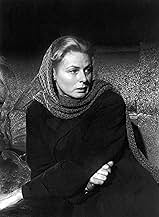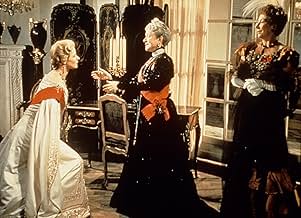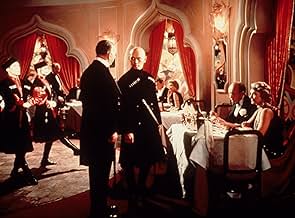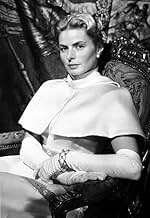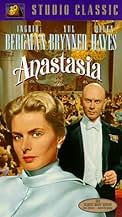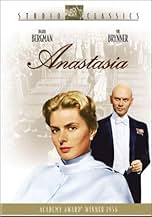VALUTAZIONE IMDb
7,0/10
9947
LA TUA VALUTAZIONE
Una povera ragazza russa che ha perso la memoria viene fatta passare per Anastasia, figlia dello zar Nicola II e unica superstite della strage dei Romanov nel luglio 1918 a Ekaterinburg.Una povera ragazza russa che ha perso la memoria viene fatta passare per Anastasia, figlia dello zar Nicola II e unica superstite della strage dei Romanov nel luglio 1918 a Ekaterinburg.Una povera ragazza russa che ha perso la memoria viene fatta passare per Anastasia, figlia dello zar Nicola II e unica superstite della strage dei Romanov nel luglio 1918 a Ekaterinburg.
- Regia
- Sceneggiatura
- Star
- Vincitore di 1 Oscar
- 7 vittorie e 6 candidature totali
Sacha Pitoëff
- Piotr Ivanovich Petrovin
- (as Sacha Pitoeff)
Grégoire Gromoff
- Stepan
- (as Gregoire Gromoff)
Ina De La Haye
- Marusia
- (as Ina de la Haye)
John Adams
- Servant
- (non citato nei titoli originali)
Paul Beradi
- Man in Bar
- (non citato nei titoli originali)
Paul Bildt
- Bit Part
- (non citato nei titoli originali)
Newton Blick
- Maître d'
- (non citato nei titoli originali)
Ernest Blyth
- Ballet Patron
- (non citato nei titoli originali)
Recensioni in evidenza
Not the most accurate rumination on whether or not Anna was really Anastasia, perhaps, but creamy, expensive entertainment, expertly done. Many share in the credit. There's a witty, epigrammatic screenplay by the always reliable Arthur Laurents (love that closing line, and most of Helen Hayes' dialogue) that manages to speculate perceptively on the nature-of-performance theme without beating it into the ground; an evocative Alfred Newman score that surpasses virtually anything else he did at Fox; fine CinemaScope photography that really uses the outer reaches of the screen, though it does dabble in spectacle for spectacle's sake at times; a superb Hayes (she could be theatrically actressy or resort to little-old-lady tricks in other movies, but here she's the real deal); a delightful Martita Hunt; and chemistry between Ingrid Bergman and Yul Brynner that suggests all the underlying sexual tension without ever stating it explicitly. Also knock-your-eye-out costume design. In a time of rampant Hollywood bloat and slow-moving epics, this one moves along, without too much pretension. And Anatole Litvak's direction, while no great shakes, is nicely paced.
This is a great movie with fabulous performances by Brynner, Bergman, and Hayes. My one complaint is not about the movie, but the videotape. Litvak made a beautiful movie and used every inch of the screen. There are multiple scenes where the three principals are located left, right, and center. With pan-and-scan you can never see more than two of them at a time. This movie deserves to be re-released in its original aspect; better yet, release it on DVD. But go ahead and see it; you will be moved by the story.
1926 , three Russian exiles (Yul Brynner , Sacha Pitoeff, Akim Tamiroff) in Paris plot to collect ten million pounds from the Bank of England by grooming a destitute , amnesical and suicidal girl Anna Koreff (Ingrid Bergman) to pose as heir to the Russian throne . 18-year-old orphan Anna is chosen by General Sergei Pavlovich Bounine (Yul Brynner) and convinces her that she could be the long lost princess and as incarnate Anastasia , the last surviving member of the Romanoff dynasty. As such , she becomes part of a scam to collect millions of rubles deposited in a foreign bank by her supposed father Nicolas , the now-dead Czar , after the fall of Russian Empire due to 1917 Revolution . While Bounin is coaching her he comes to believe she is really Anastasia . And Dowager Empress Maria Feodorovna (incomparable Helen Hayes) as the key to the conspiracy . In the end the Empress must decide her claim. From the sensational Broadway stage success that had audiences crying its acclaim!. The Great Ingrid Bergman as the mystery woman - Anastasia ; in her Best Actress Academy Award winning title role. WHEN THESE TWO MEET... But is she just impersonating the princess ? it is the beginning of the most amazing conspiracy the world has ever known!.The most amazing conspiracy the world has ever known, and love as it never happened to a man and woman before!
Enjoyable and attractive film concerning a strong drama freely based on facts , in which a girl disguising as a Russian princess , but the premise is the following : Is she really Anastasia ? . Based on Marcelle Maurette's play with big success in Broadway and all around the world . This is a charming movie in which Bergman returned to Hollywood, as Ingrid Bergman won her second Oscar in the title role , and deservedly so , for the classy portrayal of amnesia victim chosen by Russian expratiate Brynner to impersonate Anastasia . As Yul Brynner as the arch-conspirator is magnificent ,playing perfectly the scheming White General ; however , both actors are out-acted by Helen Hayes who steals the show giving a sensitive acting as the Grand Duches who needs to be convinced . Support cast turn in fine acting as well , such as : Martita Hunt , Akim Tamiroff , Sacha Pitoëff , Felix Aylmer , Natalie Schafer, Ivan Desny, among others.
The motion picture was competently directed by Anatole Litvak. He was born in Ukraine and stayed in Germany working . Litvak's stay in Germany was cut short by the rise to power of Adolf Hitler. Litvak moved to France, and directed Mayerling (1936), starring Charles Boyer and Danielle Darrieux. His first film in Hollywood was The Woman I Love (1937), which starred his future wife Miriam Hopkins. His experience with diverse aspects of stagecraft, as well as his fluency in four languages enabled him to competently tackle a wide variety of subjects: from sophisticated continental comedy : Tovarich (1937) to historical drama : Anastasia (1956)) and romance All This, and Heaven Too (1940). Litvak was at his best directing taut, suspenseful crime dramas, such as Dr. Clitterhouse (1938) with Edward G. Robinson and Humphrey Bogart, ; and two tough action films starring John Garfield: Castle on the Hudson (1940) and Out of the Fog (1941). Having become an American citizen in 1940, Litvak enlisted in the US army and collaborated with Frank Capra on the wartime "Why we Fight" series of documentarie s. Arguably his best film was the superb thriller ¨Sorry , wrong the number¨and the splendid psychological drama ¨The snake pit¨ (1948), Hollywood's first attempt to seriously examine the treatment of mental illness . Indeed, the film was so influential that it precipitated changes in the American mental health system . And this ¨Anastasia¨that has a high-rating : 7/10 , better than average . And it received effusive praises from critics and very good reception by the public.
Enjoyable and attractive film concerning a strong drama freely based on facts , in which a girl disguising as a Russian princess , but the premise is the following : Is she really Anastasia ? . Based on Marcelle Maurette's play with big success in Broadway and all around the world . This is a charming movie in which Bergman returned to Hollywood, as Ingrid Bergman won her second Oscar in the title role , and deservedly so , for the classy portrayal of amnesia victim chosen by Russian expratiate Brynner to impersonate Anastasia . As Yul Brynner as the arch-conspirator is magnificent ,playing perfectly the scheming White General ; however , both actors are out-acted by Helen Hayes who steals the show giving a sensitive acting as the Grand Duches who needs to be convinced . Support cast turn in fine acting as well , such as : Martita Hunt , Akim Tamiroff , Sacha Pitoëff , Felix Aylmer , Natalie Schafer, Ivan Desny, among others.
The motion picture was competently directed by Anatole Litvak. He was born in Ukraine and stayed in Germany working . Litvak's stay in Germany was cut short by the rise to power of Adolf Hitler. Litvak moved to France, and directed Mayerling (1936), starring Charles Boyer and Danielle Darrieux. His first film in Hollywood was The Woman I Love (1937), which starred his future wife Miriam Hopkins. His experience with diverse aspects of stagecraft, as well as his fluency in four languages enabled him to competently tackle a wide variety of subjects: from sophisticated continental comedy : Tovarich (1937) to historical drama : Anastasia (1956)) and romance All This, and Heaven Too (1940). Litvak was at his best directing taut, suspenseful crime dramas, such as Dr. Clitterhouse (1938) with Edward G. Robinson and Humphrey Bogart, ; and two tough action films starring John Garfield: Castle on the Hudson (1940) and Out of the Fog (1941). Having become an American citizen in 1940, Litvak enlisted in the US army and collaborated with Frank Capra on the wartime "Why we Fight" series of documentarie s. Arguably his best film was the superb thriller ¨Sorry , wrong the number¨and the splendid psychological drama ¨The snake pit¨ (1948), Hollywood's first attempt to seriously examine the treatment of mental illness . Indeed, the film was so influential that it precipitated changes in the American mental health system . And this ¨Anastasia¨that has a high-rating : 7/10 , better than average . And it received effusive praises from critics and very good reception by the public.
Bergman is charming as an amnesiac young woman who is recruited by Brynner to impersonate the daughter of the late czar. Bergman won her second Oscar for her portrayal. Brynner is good as the exiled Russian who tries to bring her back into a world she once may have known and Hayes is stand out as the grand dutchess who strives to find the truth behind this girls' credentials. Crisp direction from Anatole Litvak and a lively supporting cast of Akim Tamiroff make this a simply ravishing film.
8n-mo
"Anastasia" is not a film for everyone. Those who insist on historical accuracy in films depicting real people and events would do best to stay away from the movie house altogether. "Anastasia," however, is not exactly about real people, although it does incorporate the lives of real humans and parallels with their true stories to depict a compelling "what-if" scenario and this is incredibly effective, even after DNA tests have revealed that "Anna Anderson" was definitely not Anastasia Nikolavena Romanov but instead, in all likelihood a Kashubian factory worker. (I am unaware whether she ever used the name "Anna Koreff.")
As a matter of fact, those who are familiar with the real story are in for an even grander treat. We are thrown into 1928 Paris with a brief shot of this wretched madwoman at Russian Easter, lonely and rejected outside the Russian Orthodox Cathedral and on the brink of suicide, and we are definitely prepared to think of see as the impostor that "Anna Anderson" was. Yet as the film progresses, we are shown a woman quite literally without any past. Michael Thornton opined of the real "Anna Anderson," "Somewhere along the way she lost and rejected (Kashubian factory worker Franziska) Schanzkowska. She lost that person totally and accepted completely she was this new person."
Ingrid Bergman's Anna Koreff, however, is not simply mentally lost: the world has lost her as well. It helps, perhaps, that Bergman is infinitely more convincing as a princess than as a vagabond, and the retrospective certitude of the falsity of "Anna Anderson"'s claim helps to disguise her limits at the beginning of the film when, like Yul Brynner's General Bounine, we are meant to doubt her identity. Bounine creates Koreff's new identity as the Grand Duchess Anastasia, and so effectively that he begins to believe in it himself. But the entirely unsolvable questions remain:
Is Anna Koreff Anastasia? Does she actually believe she is Anastasia? More ominously, whoever she is, does she even truly and consciously remember?
This piece carefully avoids resolving these questions. On the one hand, the speed and thoroughness with which she slides into her new role is difficult to explain and impossible to deny. On the other hand, the ending (among other things) is cleverly constructed so as to expose her assumed royal identity as a construction. This is not, of course, the real story, and in the post-1900 world, such a thorough and complete break with any sort of past anchor is next to impossible. But if it happened... this may be just how it happened.
"Anastasia" is above all a beautifully designed film, full of elegance and taste. Ingrid Bergman is as beautiful as the interior architecture against which she assumes her royal identity. Again, it is not a film for everyone: many will have great difficulty connecting and sympathizing with the royal circles and personalities in this tome, but those who are able to understand pre-modern, pre-liberal (c.f. human) sensibilities will love it. Helen Hayes is absolutely perfect and inspiring as the Dowager Empress Maria Feodorovna (it is plain to see how the real Empress was so beloved in her adopted Russia), and her chemistry with Bergman is incredible to behold. The only thing I can find to critique is that the script--and to some extent a steely wall between Bergman and Brynner--does not fully back up the eventual culmination of the relationship between Koreff and Bounine; the conclusion fits quite well thematically but is mildly illogical with regard to the plot. Still, this is a minor complaint, as "Anastasia" is first and foremost a film about identity, and one that will jar and confound its viewers time and again.
As a matter of fact, those who are familiar with the real story are in for an even grander treat. We are thrown into 1928 Paris with a brief shot of this wretched madwoman at Russian Easter, lonely and rejected outside the Russian Orthodox Cathedral and on the brink of suicide, and we are definitely prepared to think of see as the impostor that "Anna Anderson" was. Yet as the film progresses, we are shown a woman quite literally without any past. Michael Thornton opined of the real "Anna Anderson," "Somewhere along the way she lost and rejected (Kashubian factory worker Franziska) Schanzkowska. She lost that person totally and accepted completely she was this new person."
Ingrid Bergman's Anna Koreff, however, is not simply mentally lost: the world has lost her as well. It helps, perhaps, that Bergman is infinitely more convincing as a princess than as a vagabond, and the retrospective certitude of the falsity of "Anna Anderson"'s claim helps to disguise her limits at the beginning of the film when, like Yul Brynner's General Bounine, we are meant to doubt her identity. Bounine creates Koreff's new identity as the Grand Duchess Anastasia, and so effectively that he begins to believe in it himself. But the entirely unsolvable questions remain:
Is Anna Koreff Anastasia? Does she actually believe she is Anastasia? More ominously, whoever she is, does she even truly and consciously remember?
This piece carefully avoids resolving these questions. On the one hand, the speed and thoroughness with which she slides into her new role is difficult to explain and impossible to deny. On the other hand, the ending (among other things) is cleverly constructed so as to expose her assumed royal identity as a construction. This is not, of course, the real story, and in the post-1900 world, such a thorough and complete break with any sort of past anchor is next to impossible. But if it happened... this may be just how it happened.
"Anastasia" is above all a beautifully designed film, full of elegance and taste. Ingrid Bergman is as beautiful as the interior architecture against which she assumes her royal identity. Again, it is not a film for everyone: many will have great difficulty connecting and sympathizing with the royal circles and personalities in this tome, but those who are able to understand pre-modern, pre-liberal (c.f. human) sensibilities will love it. Helen Hayes is absolutely perfect and inspiring as the Dowager Empress Maria Feodorovna (it is plain to see how the real Empress was so beloved in her adopted Russia), and her chemistry with Bergman is incredible to behold. The only thing I can find to critique is that the script--and to some extent a steely wall between Bergman and Brynner--does not fully back up the eventual culmination of the relationship between Koreff and Bounine; the conclusion fits quite well thematically but is mildly illogical with regard to the plot. Still, this is a minor complaint, as "Anastasia" is first and foremost a film about identity, and one that will jar and confound its viewers time and again.
Lo sapevi?
- QuizAt the time of filming, those at Fox were not aware that the real Anna Anderson was still alive. After this came to their attention, they flew to her home in Germany and asked permission to use her name. It should be noted that, in the film, the full name "Anna Anderson" is never used, although "Mrs. Anderson" is briefly employed as an incognito in the later stages of the story.
- BlooperWhile on the train to Copenhagen, Anna, studying a photograph of the fictional Prince Paul, can't remember how old she was when she was engaged to him. Bounine answers, "Sixteen."
In reality, neither the Grand Duchess Anastasia nor any of her three sisters were ever engaged.
- Curiosità sui creditiOpening credits prologue: PARIS 1928
RUSSIAN EASTER
- ConnessioniFeatured in Concept (1964)
I più visti
Accedi per valutare e creare un elenco di titoli salvati per ottenere consigli personalizzati
Dettagli
- Data di uscita
- Paese di origine
- Lingue
- Celebre anche come
- Anastasia, la princesa vagabunda
- Luoghi delle riprese
- Knebworth House, Knebworth, Hertfordshire, Inghilterra, Regno Unito(Palace of the Empress)
- Azienda produttrice
- Vedi altri crediti dell’azienda su IMDbPro
Botteghino
- Budget
- 3.520.000 USD (previsto)
- Tempo di esecuzione1 ora 45 minuti
- Colore
- Proporzioni
- 2.55 : 1
Contribuisci a questa pagina
Suggerisci una modifica o aggiungi i contenuti mancanti


